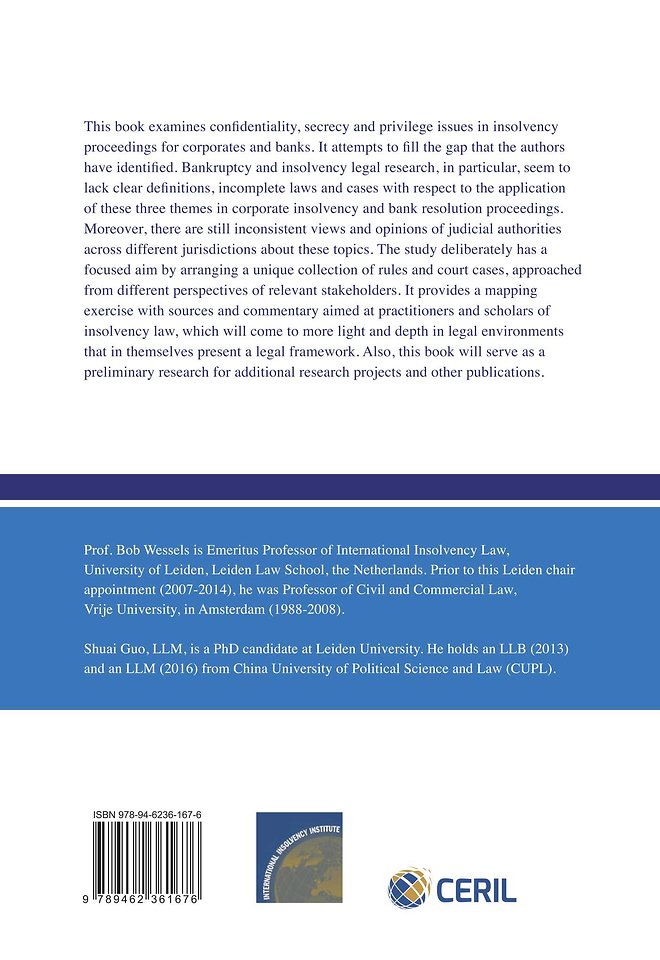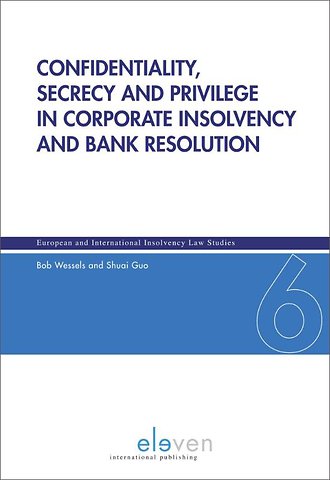



Bob Wessels is Professor Emeritus of International Insolvency Law at the University of Leiden (The Netherlands).
Meer over de auteursConfidentiality, secrecy and privilege in corporate insolvency and bank resolution
Gebonden Engels 2020 1e druk 9789462361676Samenvatting
This book examines confidentiality, secrecy and privilege issues in insolvency proceedings for corporates and banks. It attempts to fill the gap that the authors have identified. Bankruptcy and insolvency legal research, in particular, seem to lack clear definitions, incomplete laws and cases with respect to the application of these three themes in corporate insolvency and bank resolution proceedings. Moreover, there are still inconsistent views and opinions of judicial authorities across different jurisdictions about these topics.
The study deliberately has a focused aim by arranging a unique collection of rules and court cases, approached from different perspectives of relevant stakeholders. It provides a mapping exercise with sources and commentary aimed at practitioners and scholars of insolvency law, which will come to more light and depth in legal environments that in themselves present a legal framework. Also, this book will serve as a preliminary research for additional research projects and other publications.
Trefwoorden
vertrouwelijkheid insolventierecht bankrecht faillissementrecht verschoningsrecht geheimhouding advocaat-cliënt privilege bankgeheim curatoren bank resolution schuldeisers professionele geheimhouding grensoverschrijdende insolventie informatietoegang rechterlijke macht toezichthouders financiële instellingen internationale samenwerking juridische ethiek herstructurering transparantie depositogarantiestelsels
Trefwoorden
Specificaties
Lezersrecensies
Inhoudsopgave
U kunt van deze inhoudsopgave een PDF downloaden
List of Abbreviations xi
1 Introduction 1
1.1 Confidentiality, Secrecy and Privilege 1
1.2 Purpose of This Book 2
1.3 Structure of This Book 4
2 The Concepts of Confidentiality, Secrecy and Privilege 5
2.1 Confidentiality 5
2.1.1 Confidentiality vis-à-vis Privacy 5
2.1.2 Confidentiality vis-à-vis Data Privacy 6
2.1.3 The Concept of Confidentiality for Lawyers 7
2.2 Secrecy 12
2.2.1 Legal Professional Secrecy 12
2.2.2 Bank Secrecy 14
2.3 Privilege (Attorney-Client Privilege) 14
3 Debtors 31
3.1 Debtors’ Duty of Disclosure 31
3.2 Debtors’ Attorney-Client Privilege 32
3.2.1 The Status Quo – Conflicting Views 33
3.2.2 Corporate Debtors: The Succession Theory 36
3.2.3 Individual Debtors: The Human Right Principle 38
3.2.4 Other Issues 44
3.2.4.1 Pre-Insolvency Disputes 44
3.2.4.2 Survival of Attorney-Client Privilege after a Company’s Dissolution 44
3.2.4.3 Investigations, Exploration, Enquiry 44
3.2.5 Applicable Law in Cross-Border Insolvency 45
3.3 Non-Disclosure of Confidential Information 46
4 Insolvency Practitioners 47
4.1 The Power to Obtain Information in Relation to Debtors 47
4.1.1 Exclusion of Confidential, Secret and Privileged Information 47
4.1.2 Exterritorial Effect of IPs’ Power to Access Information 50
4.2 Duty of Confidentiality 52
4.2.1 Statutory Basis 52
4.2.2 Application of Legal Professionals’ Rules 55
4.2.3 Disclosure of Information Obtained in Insolvency Proceedings 56
4.3 Confidentiality in Cross-Border Communication and Cooperation 57
5 Courts and Insolvency Authorities 59
5.1 Public Access to Court Documents in Insolvency Proceedings 59
5.1.1 Public Access to Court Documents 59
5.1.2 Public Access to Court Documents in Insolvency Proceedings 61
5.2 Confidentiality in Out-of-Court Restructuring 64
5.3 Privilege 66
5.4 Confidentiality in Cross-Border Cooperation and Communication 66
6 Creditors 69
6.1 The Power to Access Debtor’s Information 69
6.1.1 Creditors and Creditors’ Committees’ Right to Access Information 69
6.1.2 Duty of Confidentiality 71
6.1.3 Access to Privileged Documents 72
6.1.4 Restriction on Trade 74
6.1.4.1 Trading Walls 74
6.1.4.2 Market Abuse Regulation 74
6.2 Protection of Debtor’s Confidential Information 75
6.2.1 Protective Order 75
6.2.2 Settlement with a Debtor 76
7 Other Stakeholders 79
7.1 Bidders/Acquirers in a Sale of Business Process 79
7.1.1 Confidentiality Agreements 79
7.1.2 Sale Including Privileged Documents 80
7.2 Clients 80
8 Banks (As Professional Service Providers) 83
8.1 Bank Secrecy 83
8.1.1 The Contractual and Statutory Basis for Bank Secrecy 83
8.1.2 Exceptions to Bank Secrecy 85
8.2 Bank Secrecy in Insolvency Proceedings 87
8.2.1 Access to Information Protected by Bank Secrecy 87
8.2.2 Cross-Border Issues 88
9 Banks (As Debtors) 99
9.1 Bank Insolvency and Bank Resolution 99
9.1.1 Bank Insolvency 99
9.1.2 Bank Resolution 101
9.2 Banks’ Duty of Providing Information to Resolution Authorities 104
9.2.1 Professional Secrecy versus Duty of Disclosure 104
9.2.2 Recovery and Resolution Plans (Living Wills) and Confidential Information Attached Therein 105
9.3 Assertion and Waiver of Attorney-Client Privilege in Bank Insolvency/ Resolution 106
9.4 Bridge Institutions 108
10 Resolution Authorities and Other Agencies 109
10.1 Designation of Resolution Authorities 109
10.2 The Power of Resolution Authorities to Obtain Debtors’ Information 110
10.3 Duty of Confidentiality of Resolution Authorities 110
10.3.1 The Duty of Confidentiality in Resolution 110
10.3.2 Persons Subject to Duty of Confidentiality 112
10.3.3 Requirements for the Fulfilment of Duty of Confidentiality 113
10.3.4 Duty of Confidentiality versus Information Sharing 115
10.4 Deposit Guarantee Schemes 118
10.4.1 Depositors and Deposit Guarantee Schemes 118
10.4.2 Duty of Confidentiality for Deposit Insurers 120
11 Summary and Conclusions 123
Bibliography 133
Annex I: List of cases 143
Annex II: Duty of confidentiality for insolvency practitioners 151
Annex III: Duty of confidentiality for courts 159
Annex IV: Selected List of Regulations 161
Anderen die dit boek kochten, kochten ook
Rubrieken
- advisering
- algemeen management
- coaching en trainen
- communicatie en media
- economie
- financieel management
- inkoop en logistiek
- internet en social media
- it-management / ict
- juridisch
- leiderschap
- marketing
- mens en maatschappij
- non-profit
- ondernemen
- organisatiekunde
- personal finance
- personeelsmanagement
- persoonlijke effectiviteit
- projectmanagement
- psychologie
- reclame en verkoop
- strategisch management
- verandermanagement
- werk en loopbaan





